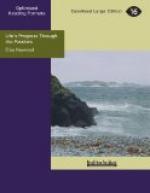Natura’s too great compliance with their intreaties in this point, had like to have proved fatal to him:—the strength of the wines, and drinking them in a much larger quantity than he had been accustomed to, so inflamed his blood, that he soon fell into a violent fever, which for some days gave those that attended him, little hopes of his recovery; but by the skill of his physician, joined to his youth, and the goodness of his constitution, the force of the distemper at last abated, yet could not be so intirely eradicated, as not to leave a certain pressure and debility upon the nerves, by some called a fever on the spirits, which seemed to threaten either an atrophy or consumption; his complexion grew pale and livid, and his strength and flesh visibly wasted; and what was yet worse, the vigour of his mind decayed, in proportion with that of his external frame, insomuch that, falling into a deep melancholy, he considered himself as on the brink of the grave, and expected nothing but dissolution every hour.
While he continued in this languishing condition, he was frequently visited by the priests, who in some parts of Germany, particularly at Vienna, are infinitely more inveterate against Protestantism than at Paris, or even at Rome, though the papal seat; as indeed any one may judge, who has heard of the many and cruel persecutions practised upon the poor Protestants by the emperors, in spite of the repeated obligations they have had to those powers who profess the doctrines of Calvin and Luther; but gratitude is no part of the characteristic of a German.
These venerable distracters of the human mind, were perpetually ringing hell and damnation in his ears, in case he abjured not, before his death, the errors in which he had been educated, and continued in so many years, and by acts of penance and devotion, reconcile himself to the mother church; they pleaded the antiquity of their faith, brought all the fathers they could muster up, to prove that alone was truly orthodox, and that all dissenting from it was a sin not to be forgiven.
On the other hand, the English ambassador’s chaplain, who knew well enough what they were about, omitted nothing that might confirm him in the principles of the reformation, and convince him that the church of England, as by law established, had departed only from the errors which had crept into the primitive church, not from the church itself, and that all the superstitious doctrines now preached up by the Romish priests, were only so many impositions of their own, calculated to inrich themselves, and keep weak minds in awe.
Natura, who had till now contented himself with understanding moral duties, and had never examined into matters of controversy between the two religions, now found both had so much to say in defence of their different modes of worship, that he became very much divided in his sentiments; and each remonstrating to him by turns, the danger of dying in a wrong belief, wrought so far upon the present weakness of his intellects, as to bring him into a fluctation of ideas, which might, in time, either have driven him into despair, or made him question the very fundamentals of a religion, the merits of which its professors seemed to place so much in things of meer form and ceremony.




